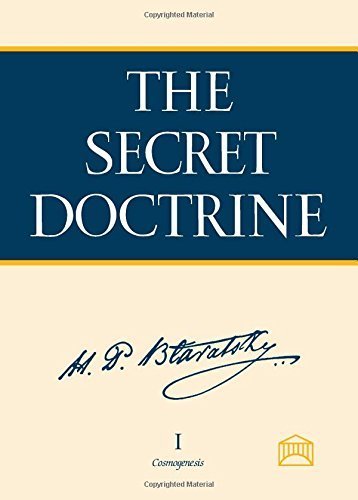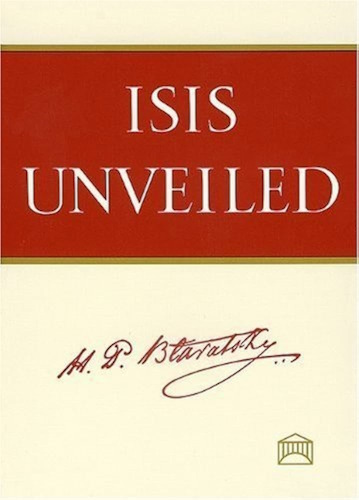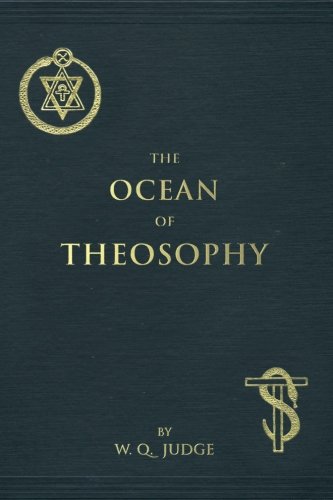














![]()
THE SECRET DOCTRINE TABLE OF CONTENTS
![]()
447
BOOK II., PART II.
THE ARCHAIC SYMBOLISM OF THE WORLD-RELIGIONS.
———————
"The narratives of the Doctrine are its cloak. The simple look only at the garment — that is, upon the narrative of the Doctrine; more they know not. The instructed, however, see not merely the cloak, but what the cloak covers."
(The Zohar, iii., 152; Franck, 119.)
"The Mysteries of the Faith (are) not to be divulged to all. . . . . It is requisite to hide in a mystery the wisdom spoken."
(Clem. Alex., "Strom." 12.)
448
CONTENTS.
———————
§ Esoteric Tenets Corroborated in every Scripture ... 449
———————
XVI. Adam-Adami ... 452
———————
XVII. The "Holy of Holies" — Its Degradation ... 459
———————
XVIII. On the Myth of the "Fallen Angel," in its Various Phases ... 475
The Evil Spirit: Who and What? ... 475
The Gods of Light proceed from the Gods of Darkness ... 483
The Many Meanings of the "War in Heaven" ... 492
———————
XIX. Is Pleroma Satan's Lair? ... 506
———————
XX. Prometheus, the Titan ... 519
His Origin in Ancient India ... 519
———————
XXI. Enoichion-Henoch ... 529
———————
XXII. The Symbolism of the Mystery-Names Iao and Jehovah, with their Relation to the Cross and Circle ... 536
Cross and Circle ... 545
The Fall of the Cross into Matter ... 553
———————
XXIII. The Upanishads in Gnostic Literature ... 563
———————
XXIV. The Cross and the Pythagorean Decade ... 573
———————
XXV. The Mysteries of the Hebdomad ... 590
Saptaparna ... 590
The Tetraktis in relation to the Heptagon ... 598
The Septenary Element in the Vedas. It corroborates the Occult Teaching concerning the Seven Globes and the Seven Races ... 605
The Septenary in the Exoteric Works ... 611
Seven in Astronomy, Science and Magic ... 618
The Seven Souls of the Egyptologists ... 630
449
BOOK II. — PART II.
———————
ESOTERIC TENETS CORROBORATED IN EVERY SCRIPTURE.
In view of the strangeness of the teachings, and of many a doctrine which from the modern scientific stand-point must seem absurd, some necessary and additional explanations have to be made. The theories contained in the Second Part of the Stanzas are even more difficult to assimilate than those which are embodied in Vol. I, on Cosmogony. Theology, therefore, has to be questioned here, as Science will be in the Addenda (Part III.). Since our doctrines differ so widely from the current ideas of both Materialism and Theology, the Occultists must be ever prepared to repel the attacks of either or of both.
The reader can never be too often reminded that, as the abundant quotations from various old Scriptures prove, these teachings are as old as the world; and that the present work is a simple attempt to render, in modern language and in a phraseology with which the scientific and educated student is familiar, archaic Genesis and History as taught in certain Asiatic centres of esoteric learning. They must be accepted or rejected on their own merits, fully or partially; but not before they have been carefully compared with the corresponding theological dogmas and the modern scientific theories and speculations.
One feels a serious doubt whether, with all its intellectual acuteness, our age is destined to discover in each western nation even one solitary uninitiated scholar or philosopher capable of fully comprehending the spirit of archaic philosophy. Nor can one be expected to do so, before the real meaning of these terms, the Alpha and the Omega of Eastern esotericism, the words Sat and Asat, — so freely used in the Rig-Veda, and elsewhere — is thoroughly assimilated. Without this key to the Aryan Wisdom, the Cosmogony of the Rishis and the Arhats is in danger of remaining a dead letter to the average Orientalist. Asat is not merely the negation of Sat, nor is it the "not yet existing"; for Sat is in itself neither the "existent," nor "being." Sat is the immutable, the ever present, changeless and eternal root, from and through which all proceeds. But it is far more than the potential force in the seed, which propels onward the process of development, or what is now called evolution. It is the ever becoming, though the never manifesting.* Sat
* The Hegelian doctrine, which identifies Absolute Being or "Be-ness" with "non-Being," and represents the Universe as an eternal becoming, is identical with the Vedanta philosophy.
450 THE SECRET DOCTRINE.
is born from Asat, and Asat is begotten by Sat: the perpetual motion in a circle, truly; yet a circle that can be squared only at the supreme Initiation, at the threshold of Paranirvana.
Barth started a reflection on the Rig-Veda which was meant for a stern criticism, an unusual, therefore, as was thought, an original view of this archaic volume. It so happened, however, that, while criticising, that scholar revealed a truth, without being himself aware of its full importance. He premises by saying that "neither in the language nor in the thought of the Rig-Veda" has he "been able to discover that quality of primitive natural simplicity, which so many are fain to see in it." Barth had Max Muller in his mind's eye when writing this. For the famous Oxford professor has throughout characterised the hymns of the Rig Veda, as the unsophisticated expression of the religious feeling of a pastoral innocent people. "In the Vedic hymns the ideas and myths appear in their simplest and freshest form;" — the Sanskrit scholar thinks. Barth is of a different opinion, however.
So divided and personal are the opinions of Sanskritists as to the importance and intrinsic value of the Rig Veda, that those opinions become entirely biassed whichever way they incline. Thus Mr. Max Muller declares that: "Nowhere is the wide distance which separates the ancient poems of India from the most ancient literature of Greece more clearly felt, than when we compare the growing myths of the Veda with the full grown and decayed myths on which the poetry of Homer is founded. The Veda is the real Theogony of the Aryan races, while that of Hesiod is a distorted caricature of the original image." This is a sweeping assertion, and perhaps rather unjust in its general application. But why not try to account for it? Orientalists cannot do so, for they reject the chronology of the Secret Doctrine, and could hardly admit the fact that between the Rig-Vedic hymns and Hesiod's Theogony tens of thousands of years have elapsed. So they fail to see that the Greek myths are no longer the primitive symbolical language of the Initiates, the disciples of the gods-Hierophants, the divine ancient "sacrificers," and that disfigured by the distance, and encumbered by the exuberant growth of human profane fancy, they now stand like distorted images of stars in running waves. But if Hesiod's Cosmogony and Theogony are to be viewed as caricatures of the original images, how much more so the myths in the Hebrew Genesis in the sight of those, for whom they are no more divine revelation or the word of God, than Hesiod's Theogony is for Mr. Gladstone.
"The poetry it (the Rig Veda) contains appears to me, on the contrary," says Barth "to be of a singularly refined character and
451 THE VEDAS WRITTEN BY INITIATES.
artificially elaborated, full of allusions and reticences, of pretensions (?) to mysticism and theosophic insight, and the manner of its expression is such as reminds one more frequently of the phraseology in use among certain small groups of initiated, than the poetic language of a large community." ("The Religions of India," p. xiii.)
We will not stop to enquire of the critic what he can know of the phraseology in use among the "initiated," or whether he belongs himself to such a group; for, in the latter case, he would hardly have used such language. But the above shows the remarkable disagreement between scholars even with regard to the external character of the Rig Veda. What, then, can any of the modern Sanskritists know about its internal or esoteric meaning, beyond the correct inference of Barth, that this Scripture has been compiled by Initiates?
The whole of the present work is an endeavour to prove this truth. The ancient adepts have solved the great problems of science, however unwilling modern materialism may be to admit the fact. The mysteries of Life and Death were fathomed by the great master-minds of antiquity; and if they have preserved them in secresy and silence, it is because these problems formed part of the sacred mysteries; and, secondly, because they must have remained incomprehensible to the vast majority of men then, as they do now. If such teachings are still regarded as chimeras by our opponents in philosophy, it may be a consolation to the Theosophists to learn, on good proofs, that the speculations of modern psychologists — whether serious Idealists, like Mr. Herbert Spencer, or wool-gathering pseudo-Idealists — are far more chimerical. Indeed, instead of resting on the firm foundation of facts in Nature, they are the unhealthy will-o'-the-wisps of materialistic imagination, of the brains that evolved them — and no more. While they deny, we affirm; and our affirmation is corroborated by almost all the sages of antiquity. Believing in Occultism and a host of invisible Potencies for good reasons, we say: Certus sum, scio quod credidi; to which our critics reply: Credat Judaeus Apella. Neither is converted by the other, nor does such result affect even our little planet. E pur se muove!
Nor is there any need of proselytizing. As remarked by the wise Cicero, "Time destroys the speculations of man, but it confirms the judgment of nature." Let us bide our time. Meanwhile, it is not in the human constitution to witness in silence the destruction of one's gods, whether they be true or false. And as theology and materialism have combined together to destroy the old gods of antiquity and seek to disfigure every old philosophical conception, it is but just that the lovers of old wisdom should defend their position, by proving that the whole arsenal of the two is, at best, formed of new weapons made out of very old material.
THE SECRET DOCTRINE TABLE OF CONTENTS














-
Urantia Book, 44:0.11 - The Celestial Artisans
Never in your long ascendancy will you lose the power to recognize your associates of former existences. Always, as you ascend inward in the scale of life, will you retain the ability to recognize and fraternize with the fellow beings of your previous and lower levels of experience. Each new translation or resurrection will add one more group of spirit beings to your vision range without in the least depriving you of the ability to recognize your friends and fellows of former estates.
-
Princess Bride 1987 Wallace Shawn (Vizzini) and Mandy Patinkin (Inigo Montoya)
Vizzini: HE DIDN'T FALL? INCONCEIVABLE.
Inigo Montoya: You keep using that word. I do not think it means what you think it means. -
Urantia Book, 117:4.14 - The Finite God
And here is mystery: The more closely man approaches God through love, the greater the reality -- actuality -- of that man. The more man withdraws from God, the more nearly he approaches nonreality -- cessation of existence. When man consecrates his will to the doing of the Father's will, when man gives God all that he has, then does God make that man more than he is.
-
Urantia Book, 167:7.4 - The Talk About Angels
"And do you not remember that I said to you once before that, if you had your spiritual eyes anointed, you would then see the heavens opened and behold the angels of God ascending and descending? It is by the ministry of the angels that one world may be kept in touch with other worlds, for have I not repeatedly told you that I have other sheep not of this fold?"
-
Urantia Book, Foreword - 0:12.12 - The Trinities
But we know that there dwells within the human mind a fragment of God, and that there sojourns with the human soul the Spirit of Truth; and we further know that these spirit forces conspire to enable material man to grasp the reality of spiritual values and to comprehend the philosophy of universe meanings. But even more certainly we know that these spirits of the Divine Presence are able to assist man in the spiritual appropriation of all truth contributory to the enhancement of the ever-progressing reality of personal religious experience—God-consciousness.
-
Urantia Book, 1:4.3 - The Mystery Of God
When you are through down here, when your course has been run in temporary form on earth, when your trial trip in the flesh is finished, when the dust that composes the mortal tabernacle "returns to the earth whence it came"; then, it is revealed, the indwelling "Spirit shall return to God who gave it." There sojourns within each moral being of this planet a fragment of God, a part and parcel of divinity. It is not yet yours by right of possession, but it is designedly intended to be one with you if you survive the mortal existence.
-
Urantia Book, 1:4.1 - The Mystery Of God
And the greatest of all the unfathomable mysteries of God is the phenomenon of the divine indwelling of mortal minds. The manner in which the Universal Father sojourns with the creatures of time is the most profound of all universe mysteries; the divine presence in the mind of man is the mystery of mysteries.
-
Urantia Book, 1:4.6 - The Mystery Of God
To every spirit being and to every mortal creature in every sphere and on every world of the universe of universes, the Universal Father reveals all of his gracious and divine self that can be discerned or comprehended by such spirit beings and by such mortal creatures. God is no respecter of persons, either spiritual or material. The divine presence which any child of the universe enjoys at any given moment is limited only by the capacity of such a creature to receive and to discern the spirit actualities of the supermaterial world.
-
Urantia Book, 11:0.1 - The Eternal Isle Of Paradise
Paradise is the eternal center of the universe of universes and the abiding place of the Universal Father, the Eternal Son, the Infinite Spirit, and their divine co-ordinates and associates. This central Isle is the most gigantic organized body of cosmic reality in all the master universe. Paradise is a material sphere as well as a spiritual abode. All of the intelligent creation of the Universal Father is domiciled on material abodes; hence must the absolute controlling center also be material, literal. And again it should be reiterated that spirit things and spiritual beings are real.
-
Urantia Book, 50:6.4 - Planetary Culture
Culture presupposes quality of mind; culture cannot be enhanced unless mind is elevated. Superior intellect will seek a noble culture and find some way to attain such a goal. Inferior minds will spurn the highest culture even when presented to them ready-made.
-
Urantia Book, 54:1.6 - True And False Liberty
True liberty is the associate of genuine self-respect; false liberty is the consort of self-admiration. True liberty is the fruit of self-control; false liberty, the assumption of self-assertion. Self-control leads to altruistic service; self-admiration tends towards the exploitation of others for the selfish aggrandizement of such a mistaken individual as is willing to sacrifice righteous attainment for the sake of possessing unjust power over his fellow beings.
-
Urantia Book, 54:1.9 - True And False Liberty
How dare the self-willed creature encroach upon the rights of his fellows in the name of personal liberty when the Supreme Rulers of the universe stand back in merciful respect for these prerogatives of will and potentials of personality! No being, in the exercise of his supposed personal liberty, has a right to deprive any other being of those privileges of existence conferred by the Creators and duly respected by all their loyal associates, subordinates, and subjects.
-
Urantia Book, 54:1.8 - True And False Liberty
There is no error greater than that species of self-deception which leads intelligent beings to crave the exercise of power over other beings for the purpose of depriving these persons of their natural liberties. The golden rule of human fairness cries out against all such fraud, unfairness, selfishness, and unrighteousness.




